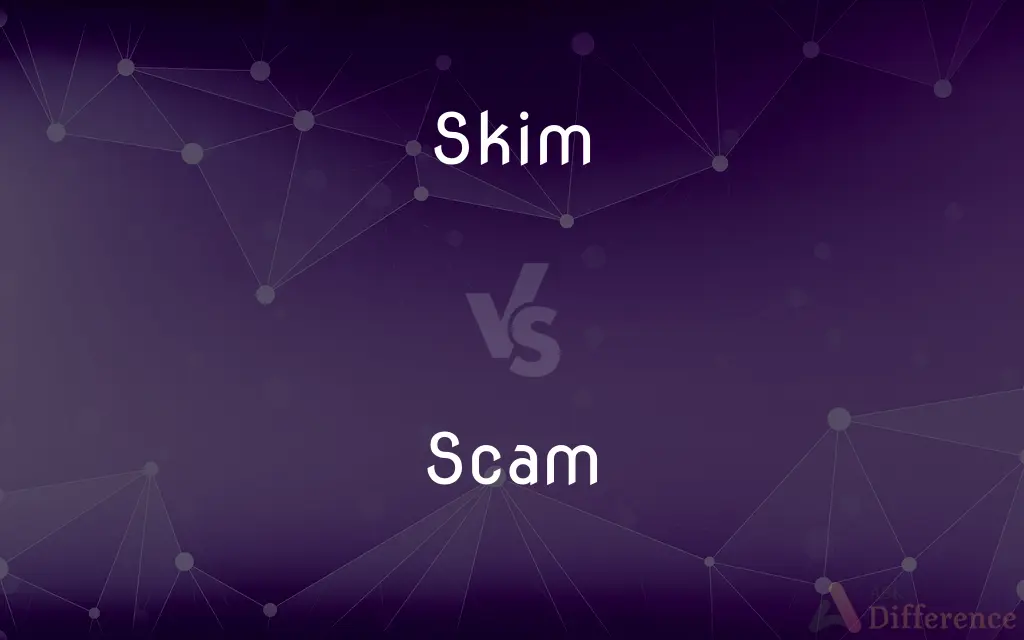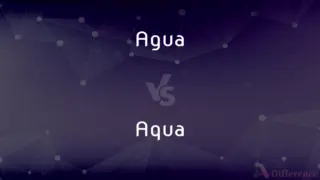Skim vs. Scam — What's the Difference?
Skim involves removing or taking off the top layer, often lightly or superficially, while scam entails a deceptive scheme or fraud to obtain something, usually money or trust, under false pretenses.

Difference Between Skim and Scam
Table of Contents
ADVERTISEMENT
Key Differences
Skim refers to the action of removing a substance from the surface of a liquid or the act of reading or glancing through text quickly and superficially. It implies a light or cursory engagement with the material or medium. For instance, skimming milk involves removing the cream that rises to the top, and skimming a book involves reading it quickly to get a general idea of the content. On the other hand, scam is a term used to describe a fraudulent scheme or trick designed to deceive someone, usually for financial gain. Scams involve manipulation, false promises, or deceit to exploit the victim's trust or lack of knowledge.
While skimming is a physical action or a method of quick, superficial reading, scamming is inherently deceptive, involving trickery and manipulation. Skimming can be a legitimate technique, such as when one skims through documents to find specific information quickly, whereas scamming is unethical and often illegal, aiming to deceive others for personal gain.
The skill set required for skimming involves the ability to quickly identify and understand the main points or essential parts of a larger body of material without getting caught up in details. In contrast, scamming requires a different set of skills, including persuasion, a deep understanding of human psychology, and often a willingness to exploit others.
Skimming can also refer to a type of financial fraud, similar to scamming, where money or data are illicitly taken from a transaction or account. However, this use of skimming is more specific and involves stealing credit card information or siphoning off funds, showing that both terms can have contexts where they overlap but are distinguished by their methods and intentions.
In daily life, skimming is often encouraged as a strategy to manage large volumes of information or perform tasks like cooking more efficiently. Scamming, however, is universally condemned and combated through legal and social measures, highlighting a fundamental difference in social acceptability and ethical standing between the two actions.
ADVERTISEMENT
Comparison Chart
Definition
Removing the top layer; reading superficially
A deceptive scheme or fraud
Contexts
Cooking, reading, information processing
Fraudulent activities, deception
Required Skills
Quick identification, superficial analysis
Persuasion, manipulation, understanding of psychology
Ethical Standing
Neutral or positive, depending on context
Negative, involves deception and exploitation
Purpose
Efficiency, quick understanding
Personal gain through deception
Compare with Definitions
Skim
To remove a substance from the surface of a liquid.
She skimmed the foam off the soup with a spoon.
Scam
A fraudulent scheme performed with the intent to deceive.
They lost money to an online investment scam.
Skim
To read or glance through quickly or superficially.
He skimmed the report during the meeting to get the gist.
Scam
To swindle or defraud someone of assets.
The con artist scammed victims out of thousands of dollars.
Skim
To move swiftly just above or on a surface.
The stone skimmed across the lake's surface.
Scam
A deceitful trick or dishonest act.
That so-called miracle cure was nothing but a scam.
Skim
In finance, to fraudulently take a small amount of money in a transaction.
The cashier was caught skimming from the register.
Scam
Engaging in a hoax or fraudulent activity.
They were scamming elderly people by pretending to be their relatives.
Skim
To cover a topic or material in a cursory manner.
The course only skimmed the surface of the subject matter.
Scam
To obtain something by deceitful means.
He scammed his way into the exclusive event by lying.
Skim
To remove floating matter from (a liquid).
Scam
A fraudulent business scheme; a swindle.
Skim
To remove (floating matter) from a liquid.
Scam
To defraud; swindle.
Skim
To embezzle (money) by taking a small portion on each transaction
Corrupt governments skimming money from foreign aid.
Scam
A fraudulent deal.
That marketing scheme looks like a scam to me.
Skim
To fail to declare part of (certain income, such as winnings) to avoid tax payment.
Scam
Something that is promoted using scams.
That new diet burger is a scam.
Skim
To copy information from (a credit card) as part of a skimming fraud.
Scam
(ambitransitive) To defraud or embezzle.
They tried to scam her out of her savings.
Skim
To coat or cover with a thin layer
"the still, shallow water solidly frozen and skimmed with white" (Barbara Hurd).
Scam
A fraudulent business scheme
Skim
(intransitive) To pass lightly; to glide along in an even, smooth course; to glide along near the surface.
Scam
Deprive of by deceit;
He swindled me out of my inheritance
She defrauded the customers who trusted her
The cashier gypped me when he gave me too little change
Skim
(transitive) To pass near the surface of; to brush the surface of; to glide swiftly along the surface of.
Skim
To hasten along with superficial attention.
Skim
To put on a finishing coat of plaster.
Skim
(transitive) To throw an object so it bounces on water.
Skimming stones
Skim
(intransitive) To ricochet.
Skim
(transitive) To read quickly, skipping some detail.
I skimmed the newspaper over breakfast.
Skim
(transitive) To scrape off; to remove (something) from a surface
Skim
(transitive) To clear (a liquid) from scum or substance floating or lying on it, by means of a utensil that passes just beneath the surface.
To skim milk
To skim broth
Skim
(transitive) To clear a liquid from (scum or substance floating or lying on it), especially the cream that floats on top of fresh milk.
To skim cream
Skim
To steal money from a business before the transaction has been recorded, thus avoiding detection.
Skim
To surreptitiously scan a payment card in order to obtain its information for fraudulent purposes.
Skim
(intransitive) To become coated over.
Skim
(of milk) Having lowered fat content.
Skim
A cursory reading, skipping the details.
Skim
(informal) Skim milk.
Skim
The act of skimming.
Skim
That which is skimmed off.
Skim
Theft of money from a business before the transaction has been recorded, thus avoiding detection.
Skim
To clear (a liquid) from scum or substance floating or lying thereon, by means of a utensil that passes just beneath the surface; as, to skim milk; to skim broth.
Skim
To take off by skimming; as, to skim cream.
Skim
To pass near the surface of; to brush the surface of; to glide swiftly along the surface of.
Homer describes Mercury as flinging himself from the top of Olympus, and skimming the surface of the ocean.
Skim
Fig.: To read or examine superficially and rapidly, in order to cull the principal facts or thoughts; as, to skim a book or a newspaper.
Skim
To pass lightly; to glide along in an even, smooth course; to glide along near the surface.
Not so when swift Camilla scours the plain,Flies o'er the unbending corn, and skims along the main.
Skim
To hasten along with superficial attention.
They skim over a science in a very superficial survey.
Skim
To put on the finishing coat of plaster.
Skim
Contraction of Skimming and Skimmed.
Skim
A thin layer covering the surface of a liquid;
There was a thin skim of oil on the water
Skim
Reading or glancing through quickly
Skim
Travel on the surface of water
Skim
Move or pass swiftly and lightly over the surface of
Skim
Examine hastily;
She scanned the newspaper headlines while waiting for the taxi
Skim
Cause to skip over a surface;
Skip a stone across the pond
Skim
Coat (a liquid) with a layer
Skim
Remove from the surface;
Skim cream from the surface of milk
Skim
Read superficially
Skim
Used of milk and milk products from which the cream has been removed;
Yogurt made with skim milk
She can drink skimmed milk but should avoid butter
Common Curiosities
Can skimming skills improve with practice?
Yes, skimming skills can improve with practice, as individuals become better at quickly identifying key points and relevant information.
Are all scams aimed at financial gain?
While most scams aim for financial gain, some may seek to obtain personal information or achieve other deceptive ends.
Do scams only occur online?
No, scams can occur both online and offline, through various methods including phone calls, mail, and in-person interactions.
What is the main purpose of skimming a text?
The main purpose is to quickly gather the main ideas or essential information without engaging with every detail.
What makes a scam successful?
A scam is often successful due to the scammer's ability to manipulate, deceive, and exploit the trust or vulnerabilities of the target.
How can one protect against scams?
Protecting against scams involves staying informed about common scam tactics, being skeptical of too-good-to-be-true offers, and verifying information before acting.
Can anyone be a target of a scam?
Yes, anyone can be a target of a scam, although scammers may target individuals they perceive as more vulnerable or gullible.
Can skimming be beneficial?
Yes, skimming can be beneficial for efficiently managing large volumes of information or for tasks requiring only a superficial understanding.
Is skimming always legal?
Skimming is legal when referring to reading or removing substances from liquids, but illegal when referring to financial fraud.
Why is scam awareness important?
Scam awareness is important to prevent financial loss, protect personal information, and avoid the emotional distress associated with being deceived.
What is the difference between skimming and scanning a text?
Skimming involves looking for the main ideas in a text, while scanning is searching for specific information or keywords within the text.
Are there legal consequences for scamming?
Yes, scamming can lead to legal consequences including fines, restitution, and imprisonment, depending on the severity and jurisdiction.
How do scams exploit human psychology?
Scams exploit human psychology through tactics like creating a sense of urgency, appealing to greed or fear, and mimicking authority or trustworthiness.
Can technology help prevent skimming fraud?
Yes, technology such as encrypted transactions and fraud detection systems can help prevent financial skimming fraud.
Is it possible to recover from being scammed?
Recovery can be challenging and varies by case, but reporting the scam to authorities and seeking legal or financial advice can help mitigate the damage.
Share Your Discovery

Previous Comparison
Boomerang vs. Ricochet
Next Comparison
Agua vs. Aqua















































